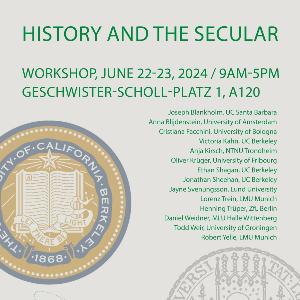
Plakat History and the Secular
Workshop at LMU Munich, Chair for Religious Studies, Faculty 10,
Organized by Jonathan Sheehan, Lorenz Trein & Robert Yelle
Funded by the Fritz Thyssen Foundation
What is the history of the secular? The question is hard to answer, not least because history and the secular coordinate in such a confusing fashion. History often seems to be an effect of the secular: once secular, we will abandon finally God’s time for human time. No less often, it appears to be a cause of the secular: once historical subjects, we will finally abandon the stories that religion tells us about ourselves. Another difficulty concerns the multiple referents of history and the secular. Religion has always had its own versions of history and the secular, which continue to circulate and compete with “secular” versions of the same. Abandoning God’s time for human time also appears both to relocate the religious within historical time, and push it beyond the horizon of history altogether. The circularities – and our tentative anticipatory tenses – signal that perhaps we are not asking the question in the right way. This workshop invites an open consideration of how we might ask it better.
Program
Saturday, June 22, 2024
09.00 - 09.15: Welcome
- Introductory Remarks
Jonathan Sheehan, Lorenz Trein, Robert Yelle
09.15 - 10.45: Session one
- Futures of an Illusion? Classical Theories of Religion and the Predicament of Modernity
Cristiana Facchini (University of Bologna)
- “Secularization” as a Narrative and as a Trope: Variations on Relating the Secular
Daniel Weidner (Martin-Luther-University Halle-Wittenberg)
11.15 - 12.45: Session two
- Distinctions before the Distinction: Early 19th-century Emigration as a Site of the Upcoming Religious/Secular Divide
Anja Kirsch (Norwegian University of Science and Technology, Trondheim)
- Worldview: A Global History of a Religious-Secular Concept at the Heart of Modern Culture Wars
Todd Weir (University of Groningen)
13.45 - 15.15: Session three
- The (Im)Possibility of Genealogical Critique – Liberalism’s ‘Religion’
Anna Blijdenstein (University of Amsterdam)
- Is Critique Secularizing?
Victoria Kahn (UC Berkeley)
15.30 - 17.00: Session four
- The Violent Theology of the Secular
Jayne Svenungsson (Lund University)
- Intimacies of Distinction: History, Sacrifice, and Civil Religion
Jonathan Sheehan (UC Berkeley)
Sunday, June 23, 2024
09.30 - 11.00: Session five
- Koselleck on the Beach: The Suntan of History, the Body of the Text, and the Problem of Secularity
Henning Trüper (ZfL Berlin)
- The Prospects of Singularity – Concepts of Time in Posthumanism
Oliver Krüger (University of Fribourg)
11.30 - 13.00: Session six
- A Secular Tradition Within and Without Religion
Joseph Blankholm (University of California at Santa Barbara)
- On the Unavailability of History
Lorenz Trein (LMU Munich)
14.00 - 15.30: Session seven
- The History of Secular Mythology: The Prophetic Reading of Genesis 49:10 and the Theological Origins of the Idea of Separation of Church and State
Robert Yelle (LMU Munich)
- How Religion Walks Through Walls: or, the Problem of Separate Spheres in the Enlightenment
Ethan H. Shagan (UC Berkeley)
15.45: Closing Discussion
